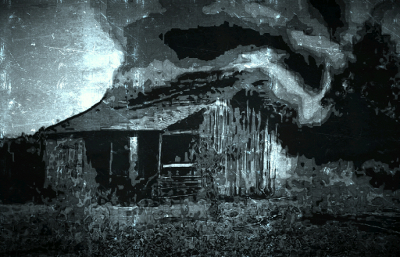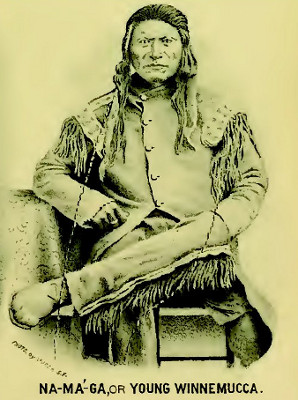Transcribed from
History of the State Of Nevada
Indians, and Their Wars In Nevada
Thompson & West, 1881
On the seventh of May, 1860, the question was pending, and the great influence of Numaga had begun to make an impression in favor of a conference instead of a collision with the whites. A secret war party, numbering nine in all, had left camp unknown to that chief, under command of Captain Soo. They reached the Carson River about sundown, at the place where James O. Williams was keeping a station on the Overland Road, ten miles northeast of where Fort Churchill was afterwards built. There are three of that war party now living, and one of them described the scene that followed. Said he:
"We get there 'bout night; sun little way up; and leave ponies back, maybe half mile. Then we all go down to cabin, and three white men come out. They look mighty scared, and talk heep to Captain Soo, and--”
"What did they say to them ?" we asked.
"Dunno; talk heep. I no understand English then."
"Well, what did they do next?"
"Bimeby* one start off and run up the road towards Buckland's, and two Injin run after him, and bring him back. Then one, he run for the river, and me after him; he jump in, and me watch; bimeby he get half-way across maybe, then drown."
"Did you shoot him when he was swimming?"
"No; nobody shoot him in water; maybe so, somebody shoot him 'fore that, he heep splatter water; no swim much. I know him drown purty soon; no use to shoot."
"While you were gone to the river what was done at the station?"
"I no see that. They tell me white man draw a knife, and then one Injin grab him from behind, then two, three—maybe four—Indian grab him; then one take his arm and do so,[here, by motion, indicated a twisting, backward wrenching of the arm] and break it, and that make him drop the knife; and then they throw him on the ground, and kill him."
"How did they kill him?"
"They no tell me that. I dunno; maybe choke him."
"How did they kill the other man ?""
Dunno. When I come back, four Injin hold him on the ground; then I go off down the river little ways, to find place to picket pony, and when I look back, see cabin on fire."
"Was it dark when they burned the station?"
"No—purty near dark, though."
The narrator insisted that they found but three whites at the station. We said to him that five men were killed, and he asked:
"How you know?"
Upon his being told that the information was from those who buried them, ho replied that,
"Maybe white man tell you heap of lies."
Finally, he suggested that it was possible that two might have remained in the house concealed; who were suffocated and perished in the flames.
The following are the names of the parties who were killed, and no one escaped from the place:
Oscar Williams, a married man, aged 33 years, and a native of Maine.
David Williams, a single man, aged 22 years, and a native of Maine.
Samuel Sullivan, a married man, aged 25 years s, and a native of New York.
John Flemming, a single man, aged 25 years, and a native of New York.
"Dutch Phil" ; unknown name, age, and residence.
The Indians camped on the bottom around the place until 2 or 3 o'clock in the morning, and then started across the eight-mile desert for Buckland's station, intending to kill the owner, after whom it is named. They passed by the ranch of C. M. Davis without molesting him, and on arriving at daylight on the farm of W. H. Bloomfield, one of their number named ────── , proposed to the band that they drive off the stock from the place and return to the lake without committing any further depredations.
"Why," we asked, " did you not kill C. M. Davis; he was much nearer to you than S. S. Buckland?"
"Davis purty good man; never abuse Ingin; no kill him. Buckland he heep bad; whip Ingin; scold Ingin; mighty cross all the time; we all say kill him, purty good."
It now being daylight, and as a further advance would be attended by considerable risk, it was determined to follow this suggestion; and one of their number was sent in advance to report what they had been doing.
Meanwhile, at the conference, Pah-Ute Chief Namaga explained to the gathering:
"You would make war upon the whites," he said; "I ask you to pause and reflect. The white men are like the stars over your heads. You have wrongs, great wrongs, that rise up like those mountains before you; but can you, from the mountain tops, reach and blot out those stars? Your enemies are like the sands in the bed of your rivers; when taken away they only give place for more to come and settle there. Could you defeat the whites in Nevada, from over the mountains in California would come to help them an army of white men that would cover your country like a blanket. 
What hope is there for the Pah-Ute? From where is to come your guns, your powder, your lead, your dried meats to live upon, and hay to feed your ponies with while you carry on this war. Your enemies have all of these things, more than they can use. They will come like the sand in a whirlwind and drive you from your homes. You will be forced among the barren rocks of the north, where your ponies will die; where you will see the women and old men starve, and listen to the cries of your children for food. I love my people let them live; and when their spirits shall to called to the Great Camp in the southern sky, let their bones rest where their fathers were buried."
As Namaga was thus making a last desperate effort to change the action of the chiefs, and was sending home conviction of its folly to their understanding, the Indian, upon a foam- flecked pony, dashed up to the council ground, and the speaker paused.
The new-comer walked into the circle; and, pointing to the southeast, said: "Moguannoga, last night, with nine braves, burned Williams' station, on the Carson River, and killed four whites."
Then Namaga, with a sad look in the direction that the warrior had pointed, replied: "There is no longer any use for counsel; we must prepare for war.”
On the evening of the massacre, the owner of the station, J. O. Williams, was camping a couple of miles further up the river, and thus escaped the fate of his brothers. The next morning he returned, and finding his place a smoldering ruin, around which lay the bodies of his murdered kinsmen, he started for Virginia City.Mr. Davis, with three other men, remained for several days at his place after the event before they knew what had transpired. When the news finally came to them, however, they started with their effects for Dayton, reaching Buckland's station the same evening— May 9th—that the Ormsby command arrived there, on its way to chastise the Indians.
*Bimeby- Eye dialect spelling of "by and by."